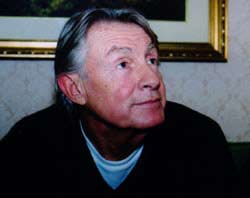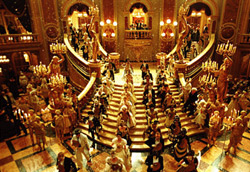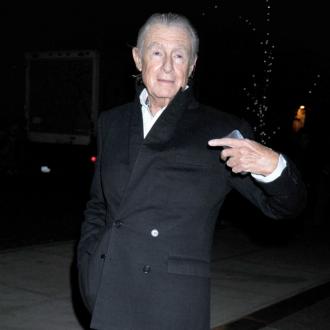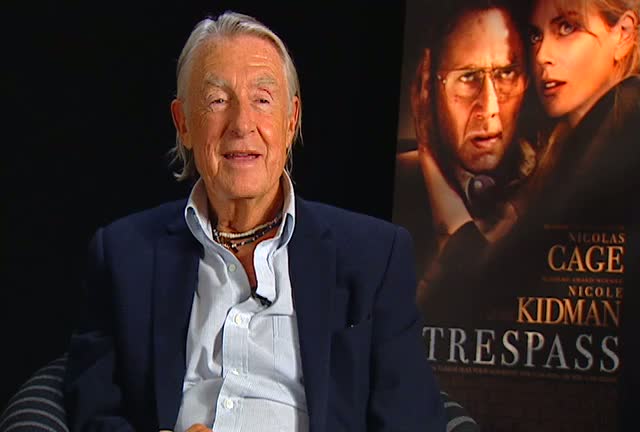
Joel Schumacher Interview
07 January 2009Charismatic director Joel Schumacher provides the 411 on his new real-time thriller 'Phone Booth'
"What's really interesting about a phone booth," Joel Schumacher grins, "is that obviously at an earlier period in history people valued privacy, and really thought they should go into a booth, close the door and not allow anyone to hear what they were talking about.
"Now people bitch about lack of privacy, but we all live out our lives on cell phones very publicly. Don't you hear people saying things you can't believe they're saying?"
A youthful-in-spirit, enjoyably carefree man of 63 with a jaunty, sardonic sense of humor, the director of the neo-Hitchcockian sniper thriller "Phone Booth" grins broadly as he recalls a private cell phone conversation he couldn't help but overhear in London.
"This pretty young blonde girl was screaming at her boyfriend because he text-messaged her that they were going away for the weekend -- and he had just told her he couldn't see her that weekend. He had text messaged the wrong girlfriend!" He pauses for a long laugh. "She was screaming at him at the top of her lungs."
That young Londoner might have wished her boyfriend could meet the same fate as the cocky young publicist at the center of Schumacher's "Phone Booth." Stu Shepard (played by Hollywood "it" star and Schumacher discovery Colin Farrell) is a guy who spends his days immersed in two-faced cellular schmoozing, yet stops once a day at the last fully-encased phone booth in Manhattan to make undocumented calls to a pretty client (a struggling actress played by Katie Holmes) who he's considering seducing behind his wife's back.
But when he answers that booth's ringing phone at the beginning of the movie, Stu finds himself trapped in a nightmare that he can't escape from by using his usual self-serving slick talk. A sniper (Kiefer Sutherland) is on the other end of the line. He has a rifle trained right on Stu, and spends the next 85 minutes (the film was shot in real-time) toying with him, threatening to shoot if he hangs up, and making him repent publicly for his egotism and philandering heart.
Excitable, enthusiastic and so keen to talk about "Phone Booth" that he deflects any questions about his just-announced future project -- a big-budget film version of Andrew Lloyd Webber's "The Phantom of the Opera" -- Schumacher is more accommodating when asked about his past -- at least in relation to his new film. So my friend Jeff Anderson from the San Francisco Examiner and I begin by asking the director about coming back from what had to be the low point of his career.
| Q: Your career has taken a really interesting turn since "Batman and Robin." You've been making mostly risky, low-budget movies. |
A: Well, I did it on purpose! It was because I had spent five years as summer blockbuster king. It was time to move on. With "Batman and Robin," I was opening toy stores in Sydney, Australia. I had awards for selling more "Batman" merchandise than any human being in the world. That was fun, but I specifically pulled out of my third (John) Grisham (adaptation), "Runaway Jury," and my third "Batman." Enough was enough. I couldn't do it anymore. I purposely did "8mm" (a dark detective thriller set in the world of snuff porn) because it was as far from a summer movie as you could get.
| Q: How did you feel about the terrible critical reception of "Batman and Robin"? |
A: Oh, grow up! It's a "Batman" movie. It's seven years ago!
| Q: Very few movies take a pummeling like that movie did. |
A: Well I think -- you know what? We deserved it. I mean, if you get a pummeling, you deserved it. But isn't it wonderful to remember a time that America was once so innocent that all we had to worry about was the next "Batman" movie?
| Q: You've never done a movie in real-time before. Were there any special challenges? |
A: Don't do it! Don't do it! This movie works, but it's pure luck. [Laughs] I mean, it has every challenge you could possibly imagine. It's all in one spot, it's all in real time, we had 10 days to shoot it and we were crazed.
| Q: 10 days? You shot it in 10 days? |
A: Yeah, yeah, I know. [Shakes his head] Don't do it! I don't recommend it!
| Q: [Laughs] |
A: You've gotta have a great cast and a great crew, but I don't think any of us thought we could do it. I think we were all scared shitless. And here's the thing: We had to stop shooting at 4 (p.m.) -- as if (the challenges) weren't bad enough -- because we'd lose the light on the street.
So we got there at 6 a.m. We'd be shooting by 6:45. We wouldn't break for lunch, we'd just pass food around all day. And we would just rock and roll 'til 4, then Matty Libatique, our great cinematographer, would say, "Outta light, guys" -- and that was it. We were doing 10-12 pages a day. There were four cameras going. The cast is on all the time -- there's no rest for anybody. We were just flying to get those performances.
| Q: At least you only had one location for 90 percent of the shoot. |
A: Yes! Exactly. We didn't have to move!
| Q: "Phone Booth" is a mean, lean 85 minutes. How long was the script? |
A: The script was about 100 pages. I mean, we could have padded it if we wanted to. But I don't think that would make a better movie....I mean, it's a guy in a phone booth. The whole point of it is that you should be on the edge of your seat. If you draw something out and linger, and then pad it -- well, to what end, really?
| Q: I understand Larry Cohen wrote the script a long time ago and had been working on it, back-burner-style, for decades. |
A: I know Larry said when he first got the idea for this, he discussed it with Alfred Hitchcock. So it's a long time ago....The script was actually about middle-aged people. The characters were wonderful, but very Damon Runyon-esque. Stu was kind of a Broadway Danny Rose character, but not sweet and charming. He was this brittled PR guy for theater. The Katie Holmes character was this gum-popping, brassy manicurist. So it sort of felt like another era. It had its own thing, but I felt very strongly the younger Stu was, the more forgivable he'd be. You know, because if you haven't learned by the time you're middle-aged that the way you treat others is important in life, then f**k you. I don't want to tell your story because you're a insensitive, self-centered moron. I've told a lot of stories about young people, and I always feel there's hope.
| Q: So when did you get involved? |
A: When I was doing "8mm" (in 1998), my agents called me and said, "There's this hot script by Larry Cohen, and there's a bidding war for it. Fox is in the lead and if they get it, they want to do it with Mel Gibson and they want you to direct it."
I was intrigued by the notion of it...but I had written a script called "Flawless" (1999) and the day I was going to Fox to basically accept the job, I found out that (Robert) DeNiro had read my script and was going to do "Flawless." So went I went into Fox, I had to say, "Look, I love you guys, I love the script, I love Mel. But I'm gonna do my movie. Bye." Then ("Phone Booth") went through machinations. I know the Hughes Brothers ("From Hell") had it for a while...
| Q: Wasn't Jim Carrey going to be the lead at one point? |
A: Jim was in and out during this period. I know Michael Bay and Will Smith had it for a while. Why it didn't get made, I don't know. But after "Flawless" and "Tigerland,"...the head of Fox 2000 came to see me and said, "You know, we never got 'Phone Booth' off the ground. Would you do it?" I said, "Sure! I'd love to. And there's this great guy in 'Tigerland' -- Colin Farrell." And they said, "No, no, no. You can't make it with an unknown!"
So I had many meetings with Jim, and he was gonna do it. I had always thought it was odd that he wanted to do it....And then he got cold feet and I understood -- I really did. He was uncomfortable with the role.
| Q: Casting Jim Carrey seems to me like a studio executive's idea. They figure it's all static, it all takes place in a phone booth, so we need someone really physical and animated to make it work. |
A: I wish they thought that way! No, they think "big star." If you were making "The Martin Luther King Story," the studio would say, "How about Tom Cruise and Julia Roberts?" That's the way every movie begins. Jim was a big name, that's all it really means. Not to take away from his talent...(but) a studio would rather pay $20 million-plus for a star than they would get a great newcomer for nothing because they can just sleep better at night. It means foreign sales. If the movie fails they can say, " Well, but look, on paper we had X, Y and Z. Didn't it look great? You would have made this movie too." Whereas if you have a failure with an unknown, it looks like you took a bad risk. The powers that be will always choose the conservative route.
| Q: So how did you sell them on Colin Farrell? |
A: I didn't! This is what happened: Jim backed out and we were just about to shoot. We went to the Toronto Film Festival, where "Tigerland" had a great reception and Colin did too. The studio executives were there and they said, "We get it. Colin is great. Here's a dollar. Go make the movie."
| Q: "Tigerland," I really liked that. But it barely opened. |
A: It barely opened anywhere! They didn't put any money behind it at all.
| Q: But it was so well received at Toronto and by the press. |
A: By everybody! I know, I know!
| Q: Do you feel like you got screwed on that? |
A: No, I don't feel we got screwed because we got such a great reception. People still rave about it all the time. And now people have discovered it on DVD, and Roger Ebert gave it an award as one of the great underrated movies of the year. Sometimes you get points for being the people who get kicked. But what was sad is that people didn't see the great performances. I was sadder for the actors than I was for me because when you do good work in this industry, you get more work. Colin got a whole career from it. But there were a lot of people besides Colin in it who were also wonderful. It would be nice if people had seen how great these kids were.
| Q: Well, that film barely got released, and this one has been caught up in the strangest trend in movies right now -- it got delayed because of similarity to terrifying current events. How did you feel about "Phone Booth" being pushed back again and again? |
A: Well, first it got delayed for September 11 because it would have been inappropriate to put a movie out about Manhattan, especially a movie with dark humor. That would have been completely wrong. Then they wanted to wait until after "Minority Report" since nobody knew yet who Colin was. Then the sniper thing happened (in Washington, D.C., in late 2002). But a strange thing happened because of that: Almost all the news shows all over the world showed clips from "Phone Booth." And by then people had seen the movie in Toronto and it was very well received. So they kept promo-ing these clips and a lot of awareness went up. Now, because of "The Recruit" and "Daredevil" -- and Colin's slutting around! -- he has a higher profile.
By the way, I love the "shock value" of Colin Farrell (who has been getting bad press for showing his wild side in public). He's 26! He smokes! He drinks! He f**ks women! [Schumacher waves his arms in the air] Ooooooo! Oooooo! He's a normal young man -- get him!
Contactmusic
Top 10 Videos
Wallace Chung
XXX
1
10 Years
Beautiful
2
Fast Girls
Fast Girls
3
Shaggy
Hey Sexy Lady
4
Air
Sexy Boy
5
The Staves
Tired As F***
6
Robin Thicke
Blurred Lines (Unrated Version)
7
All That Remains
Six (Live)
8
Fugees
Boof Baf
9
Fleur East
Sax [Live]
10
Related
Movies and Trailers

The Phantom of the Opera (2004) Movie Review
Criticism toward Joel Schumacher's attempted enactment of Andrew Lloyd Webber's cherished stage musical The Phantom...





